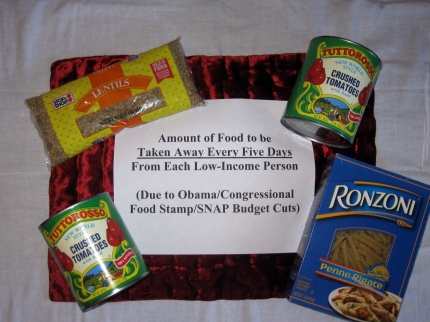The Real Impact of Food Stamp Cuts
Congress is poised to cut food stamps again, taking more away from an extended benefit created by the 2009 stimulus, before its original expiry date, and
Jul 31, 202031.8K Shares1.4M Views
Congress is poisedto cut food stampsagain, taking more away from an extended benefit created by the 2009 stimulus, before its original expiry date, and setting up an unprecedented “cliff”in food stamps, now known as Supplemental Nutrition Assistance Program, or SNAP, benefits. To demonstrate how hurtful this might prove, anti-hunger advocate Joel Berg recently spent a weekeating according to the SNAP budget.
“I had done it in 2007, as well,” he said. “This time, it was much harder, because the price of food has increased more than the benefit has increased. Last time, for instance, I ate an apple a day, along with other food. This time, I couldn’t afford a single piece of fruit.”
Berg is the executive director of the New York City Coalition Against Hunger, which represents New York’s 1,200 nonprofit soup kitchens and food pantries and its 1.4 million residents that cannot afford enough food. (A more extended version of our conversation is below.) He and other hunger advocates are incensed over the SNAP cuts, which will pay for a sweeping child-nutrition bill. The First Lady–supported legislation is pending in the House, and has passed the Senate. In essence, Congress is planning to rob a very poor Peter to pay a very poor Paul.
The cliff in food stamps means that one month, a family will receive a set amount of money, about $4.50 per person per day. The next month, they will get less. In his week eating according to the SNAP budget, Berg shopped for the first three days as if he received full benefits. For the second two, he shopped as if he received cut benefits. The result? Less food, or less healthy food.
He took photographs to demonstrate. Here’s what he could buy for a week with current benefits:
Here’s what he could buy with the cut benefits:
That means he does not get this food, under an Obama-supported plan:
Berg and I spoke briefly about this change. I lightly edited the transcript for clarity, and trimmed it down for length.
**TWI: **What is the real impact of this cut?
**Berg: **The change cuts future benefits and also restricts people from entering, or qualifying for, the program. This is the first time in the history of the program that recipients of the benefit will actually get less.
Some progressives are making a claim that this is not actually a cut, that this is somehow just a return to the baseline benefit. But that claim is really preposterous and offensive. The Center for Science in the Public interest, they’re progressive, but they have put that idea forward. If they had a cost of living increase and wage increases over five years, but then we returned them to the salary that they had five years ago, my guess is that they would see that as a cut, rather than a return to the baseline.
People in America have been socialized into expecting some sort of Frank Capra-esque happy ending all the time — somehow, magically, in the end, this will all work out. I’m sorry, but for low-income people, that is not what happens. This means people are going to suffer more. Low-income people are already in trouble due to the recession. They are suffering mightily to make sure that there is food on the table for their kids. And now, they’re going to have less of it.
As for the claim that we’ll fix it later, and we should pass the child-nutrition bill now: whether or not the House or Senate ends up changing parties at the midterm elections, we are going to have a more-conservative House and Senate. And it is also clear that the deficit is going to be bigger next year than it is this year. So people really expect that even though Congress can’t find the money now, they’re going to find it down the road — with a less-progressive Congress and a wider deficit? They’re magically going to be able to come up with funds for this later? They won’t.
**TWI: **How different was living on the cut benefit than the full benefit?
**Berg: **Well, I spent a week on food stamps — I had done it in 2007 as well. This time, it was much harder, because the price of food has increased more than the benefit has increased. Last time, for instance, I ate an apple a day, along with other food. This time, I couldn’t afford a single piece of fruit. On top of that, there was the increase from the beginning of the week to the end of the week.
People forget that the president pledged to end hunger by 2015 — they remember that he pledged to make kids healthier, but not that he also pledged to end hunger. The administration doesn’t seem to understand, or care, that this is going to increase obesity. If people on the program were buying apples a few years ago, and they can’t afford them now — we know that when the benefits are less generous, that means people aren’t buying as healthy foods.
**TWI: **And what will the impact be for kids?
**Berg: **This cut is taking something away from every other meal for children in low-income families, to help get them a better lunch. Someone in the White House last week, I saw, claimed that the child-nutrition bill will dramatically reduce child obesity.
That’s ridiculous. They are cutting the budget from kids at home to pay for kids in school. If kids eat in school every day, in a year, that’s still only 16 percent of their meals, because there are weekends, there are holidays, there are nights, there is summer. There is no way that marginally improving 16 percent of your meals is going to dramatically change your diet — especially not if you are taking away from the rest.
People want to claim victory. They want to make exaggerated claims that the child-nutrition bill will help. The most heartbreaking thing about it, for advocates, is that this is supposed to be our great champion bill that was going to solve everything! We thought it would dramatically decrease child hunger. But, the fact is, you have hunger advocates lobbying against its passage. Our emotions are ranging from outraged to heartbroken. I’m really just gobsmacked that this happened.
**TWI: **Did the stimulus bump help?
**Berg: **We did a study — we do it every year — examining the number of people going to pantries and soup kitchens in New York City, and then asking whether those groups have the resources to meet demand. In 2008, two-thirds of the soup kitchens did not — they had to reduce portion sizes, or turn people away. But in 2009, that fell to 50 percent.
Some of that was increased direct funding for pantries and kitchens. But a lot of it was the food stamp boost — it kept people from having to use food banks.
And we know that we aren’t only feeding people. We come at this from a moral position, a nutritional position, and an economic recovery position. This cut is so insane from an economic position as well — we know food stamps are the most effect form of stimulus. The jury is still out on parts of the stimulus — but the jury isn’t out on food stamps. It was a 1,000 percent, beyond home run grand slam success, if you’ll excuse me mixing metaphors.
The money went to people who needed it, rapidly, and without a lot of bureaucracy. Actually, SNAP used to have something like a 15 percent administrative overhead drag. Since the stimulus bill increased benefits and boosted the number of people getting them, administrative costs are down to 7 percent. For all the conservative ranting — vouchers, vouchers, vouchers — food stamps are a voucher program! You’re not being sent to a government-run food center. You’re getting a voucher to use in the private market. It is good for businesses too.
**TWI: **Are you preparing to explain the cuts to SNAP recipients? Are we going to have to prep them, so they know their budget is getting tighter?
**Berg: **I won’t know what there is to say. I’m rarely at a loss for words. But what do I say to these people? You were screwed? You were shafted? Your children have less food? I couldn’t look in some one’s eyes and tell them that, and I don’t know how a senator could either. What do you say? Your kid’s need for food was temporary?
**TWI: **What aren’t we in the press focusing on?
**Berg: **Everyone is focusing on the child-nutrition and obesity pledge. But Obama made a hunger pledge too.
With Matt Lauer yesterday, Obama was asked about poverty, and he basically gave an answer that George W. Bush would have given. He said that increasing economic growth will help poverty. It will. I agree that job creation is the most important thing. But when the unemployment rate was a lot lower, there were still millions of Americans who needed these benefits.
I’ve been pulling my punches, and my progressive colleagues have been pulling their punches, because we’re rooting for this administration to succeed. But honestly, if George W. Bush did what they’re trying to do, we’d be camping out in front of the White House. Goodwill only goes so far when tens of thousands of children need food.

Hajra Shannon
Reviewer
Latest Articles
Popular Articles


